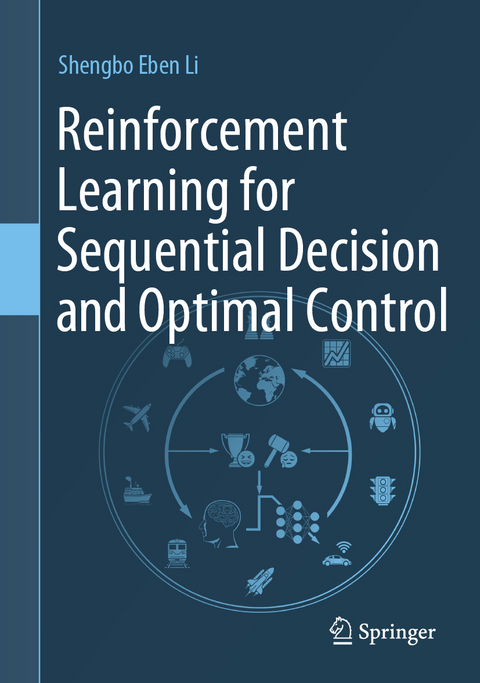
Reinforcement Learning for Sequential Decision and Optimal Control
Springer Verlag, Singapore
978-981-19-7783-1 (ISBN)
As an interdisciplinary field of trial-and-error learning and optimal control, RL resembles how humans reinforce their intelligence by interacting with the environment and provides a principled solution for sequential decision making and optimal control in large-scale and complex problems. Since RL contains a wide range of new concepts and theories, scholars may be plagued by a number of questions: What is the inherent mechanism of reinforcement learning? What is the internal connection between RL and optimal control? How has RL evolved in the past few decades, and what are the milestones? How do we choose and implement practical and effective RL algorithms for real-world scenarios? What are the key challenges that RL faces today, and how can we solve them? What is the current trend of RL research? You can find answers to all those questions in this book.
The purpose of the book is to help researchers and practitioners take a comprehensive view of RL and understand the in-depth connection between RL and optimal control. The book includes not only systematic and thorough explanations of theoretical basics but also methodical guidance of practical algorithm implementations. The book intends to provide a comprehensive coverage of both classic theories and recent achievements, and the content is carefully and logically organized, including basic topics such as the main concepts and terminologies of RL, Markov decision process (MDP), Bellman’s optimality condition, Monte Carlo learning, temporal difference learning, stochastic dynamic programming, function approximation, policy gradient methods, approximate dynamic programming, and deep RL, as well as the latest advances in action and state constraints, safety guarantee, reference harmonization, robust RL, partially observable MDP, multiagent RL, inverse RL, offline RL, and so on.
Prof. Shengbo Eben Li received his M.S. and Ph.D. degrees from Tsinghua University in 2006 and 2009. He is currently a professor at Tsinghua University in the interdisciplinary field of autonomous driving and artificial intelligence. Before joining Tsinghua University, he has worked at Stanford University, University of Michigan, and UC Berkeley. His active research interests include intelligent vehicles and driver assistance, deep reinforcement learning, optimal control and estimation, etc. He has published more than 130 peer-reviewed papers in top-tier international journals and conferences. He is the recipient of best paper awards (finalists) of IEEE ITSC, ICCAS, IEEE ICUS, IEEE IV, L4DC, etc. He has received a number of important academic honors, including National Award for Technological Invention of China (2013), National Award for Progress in Sci & Tech of China (2018), Distinguished Young Scholar of Beijing NSF (2018), and Natural Science Award of Chinese Association of Automation (2021). He also serves as Board of Governor of IEEE ITS Society, Senior AE of IEEE OJ ITS, and AEs of IEEE ITSM, IEEE Trans ITS, Automotive Innovation, etc.
Chapter 1 Introduction of Reinforcement Learning.- Chapter 2 Principles of RL Problems.- Chapter 3 Model-free Indirect RL: Monte Carlo.- Chapter 4 Model-Free Indirect RL: Temporal-Difference.- Chapter 5 Model-based Indirect RL: Dynamic Programming.- Chapter 6 Indirect RL with Function Approximation.- Chapter 7 Direct RL with Policy Gradient.- Chapter 8 Infinite Horizon Approximate Dynamic Programming.- Chapter 9 Finite Horizon ADP and State Constraints.- Chapter 10 Deep Reinforcement Learning.- Chapter 11 Advanced RL Topics.
| Erscheinungsdatum | 07.12.2022 |
|---|---|
| Zusatzinfo | 213 Illustrations, color; 4 Illustrations, black and white; XXX, 462 p. 217 illus., 213 illus. in color. |
| Verlagsort | Singapore |
| Sprache | englisch |
| Maße | 168 x 240 mm |
| Themenwelt | Informatik ► Theorie / Studium ► Künstliche Intelligenz / Robotik |
| ISBN-10 | 981-19-7783-6 / 9811977836 |
| ISBN-13 | 978-981-19-7783-1 / 9789811977831 |
| Zustand | Neuware |
| Informationen gemäß Produktsicherheitsverordnung (GPSR) | |
| Haben Sie eine Frage zum Produkt? |
aus dem Bereich


